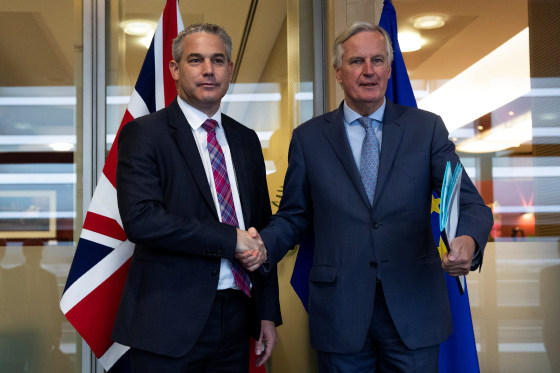LONDON — A potential breakthrough in talks between the U.K. and the European Union has raised hopes the two sides might be able to agree to a Brexit divorce deal ahead of a critical summit next week.
The European Commission said in a statement Friday that negotiators "have agreed to intensify discussions over the coming days."
An agreement, which looked unlikely just days ago, could break the deadlock that has paralysed British politics since the country voted to leave the bloc in a June 2016 referendum.
Prime Minister Boris Johnson has staked his leadership on a promise to leave the E.U. on the current Oct. 31 deadline with or without a deal.
But rebel lawmakers passed a law forcing him to seek an extension if a deal has not been agreed by next Saturday, in an effort to prevent a "no-deal Brexit" that could have devastating consequences for the country.
The stage is now set for a crunch E.U. summit in Brussels late next week, which will likely be followed by a decisive set of votes in Parliament.
The surprise breakthrough in talks came after Prime Minister Boris Johnson met his Irish counterpart, Leo Varadkar, in northwest England Thursday. A joint statement said both sides could see a "pathway to a possible deal."
The E.U.'s chief negotiator, Michel Barnier, then had what was described as a "constructive meeting" with the U.K.'s Brexit minister, Stephen Barclay.
The two sides will now proceed to the next stage of talks, jokingly referred to as entering "the tunnel" due to their arduous nature.
That means negotiators can move on from the mostly theoretical discussions that have been taking place for the past few weeks and work toward a final agreement.
However, president of the European Council Donald Tusk struck a cautious note Friday and pointed out that the U.K. has not yet proposed a deal that the 27 remaining members of the E.U. consider acceptable.
This is merely the latest in a complex, fast-moving story that has seen the E.U. repeatedly reject British proposals for what should happen to Northern Ireland after Brexit.
Northern Ireland is part of the U.K. but shares a land border with the Irish Republic, which remains a key E.U. member. Goods and people cross the border freely and without checks at the moment — one of the conditions of the Good Friday Agreement of 1998.
London's complex workaround announced last week — and quickly dismissed by Irish leaders on both sides of the border — involved Northern Ireland remaining in the E.U.'s single market for goods, but bound by U.K. customs rules.
This posed a range of problems for the highly integrated all-Ireland economy and is further complicated by the question of how the Northern Ireland Assembly — which has been suspended since 2017 — would agree to such a system.
What concessions the British have made in order to secure deeper talks also remain unclear.
As it stands, the U.K. will leave the E.U. with or without a deal on Oct. 31. But a law passed by the British Parliament compels Johnson to ask the E.U. for a Brexit extension — something he has repeatedly said he doesn't want to do.
It would be the third Brexit extension to date and mark a huge defeat for Johnson's "do or die" promise of leaving on time.
And most observers see next week's E.U. summit in Brussels as the last practical chance for Johnson to secure a withdrawal agreement and avoid an extension.
Even if a deal is agreed, however, it remains unclear whether lawmakers will vote to ratify it.
Johnson has been dealt a series of defeats in Parliament and saw his efforts to shut it down in order to force through his hardline Brexit plans ruled unlawful by the U.K's Supreme Court.
His predecessor Theresa May failed on three occasions to get a deal through, leading her to resign earlier this year.



